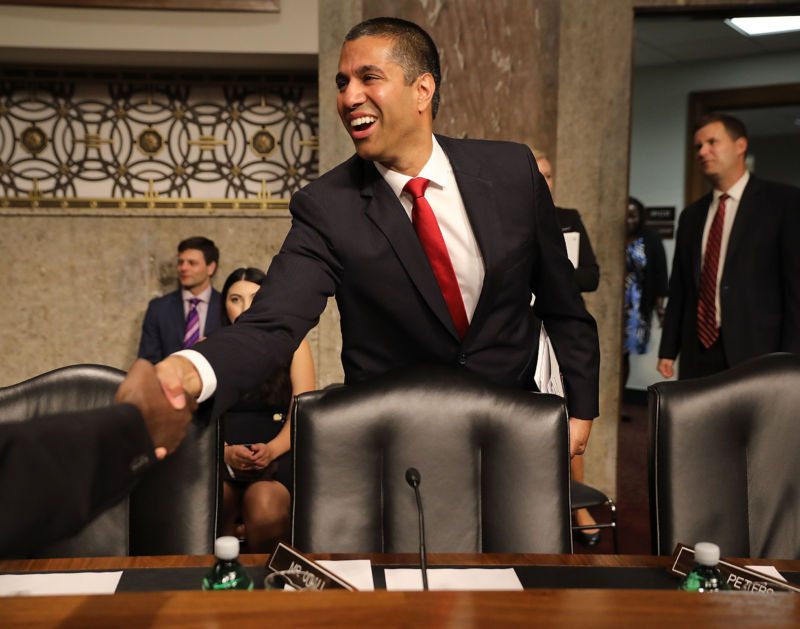
The Federal Communications Commission will move ahead with its vote to kill net neutrality rules next week despite an unresolved court case that could strip away even more consumer protections.
FCC Chairman Ajit Pai says that net neutrality rules aren't needed because the Federal Trade Commission can protect consumers from broadband providers. But a pending court case involving AT&T could strip the FTC of its regulatory authority over AT&T and similar ISPs.
A few dozen consumer advocacy groups and the City of New York urged Pai to delay the net neutrality-killing vote in a letter today. If the FCC eliminates its rules and the court case goes AT&T's way, there would be a "'regulatory gap' that would leave consumers utterly unprotected," the letter said.
When contacted by Ars, Pai's office issued this statement in response to the letter:
This is just evidence that supporters of heavy-handed Internet regulations are becoming more desperate by the day as their effort to defeat Chairman Pai's plan to restore Internet freedom has stalled. The vote will proceed as scheduled on December 14.
Consumer advocacy group Public Knowledge is not satisfied by Pai's response.
"Forty organizations ask the Federal Communications Commission why, if they are relying on the FTC to protect consumers, they do not do the prudent thing and wait until the cloud over FTC jurisdiction is resolved," Public Knowledge Senior VP Harold Feld told Ars. "The FCC's official response is name calling. This tells anyone interested who is 'fear mongering' and who really has the interests of consumers at heart."
AT&T vs. the FTC
The court case centers on the FTC's attempt to punish AT&T for throttling the mobile Internet connections of customers with unlimited data plans. While the FTC is not legally able to regulate common carriers, the agency says it can regulate the non-common carriage portions of a company that is otherwise a common carrier.
At the time of the throttling, AT&T was a common carrier for landline phone and mobile voice service but not for mobile Internet access. AT&T argued that its common carrier status prevented the FTC from regulating any portion of its business, and a panel of judges at the US Court of Appeals for the Ninth Circuit sided with AT&T in August 2016.
The ruling seemed to leave the FTC without any enforcement powers over the broadband businesses of traditional phone companies like AT&T and Verizon. But there was no "regulatory gap" because the FCC had classified ISPs as common carriers in a February 2015 decision, giving itself broad authority over broadband service.
Now that the FCC is led by Republicans, it plans to eliminate the common carrier classification of broadband providers and says the FTC will pick up the slack. Eliminating the common carrier classification of broadband will "[r]estore the Federal Trade Commission's ability to protect consumers online from any unfair, deceptive, and anticompetitive practices," Pai's proposal says.
FTC may retain power, but it’s not a done deal
Pai's argument is supported by a May 2017 decision by the Ninth Circuit that vacated AT&T's victory over the FTC and ordered the case to be reheard en banc.
The decision to rehear the case before the full court may indicate that the FTC will ultimately be allowed to regulate broadband providers even when those companies offer non-common carrier services such as traditional phone lines. But it isn't a certainty because the full court still hasn't issued its decision.
"Given the enormous danger to consumers of losing all protections should the Ninth Circuit decide to affirm the panel decision and side with AT&T Mobility, the FCC should delay a vote until the en banc panel of the Ninth Circuit issues its decision," consumer advocacy groups and the city of New York wrote to Pai today.
Pai's anti-net neutrality proposal says that there is no need to wait for the final decision from the Ninth Circuit.
"Consistent with the Commission's request, the Ninth Circuit granted rehearing en banc of the panel decision, and, in doing so, it set aside the earlier panel opinion," Pai's proposal says. "In light of these considerations and the benefits of reclassification, we find objections based on FTC v. AT&T Mobility insufficient to warrant a different outcome."
But the danger of the Ninth Circuit stripping the FTC of regulatory authority is made even greater by the FCC's proposal to preempt state consumer protection laws, the letter from consumer advocacy groups said:
This potential regulatory gap is further compounded by the Draft Order's purported preemption of any state regulations the FCC deems "incompatible" with the newly announced "deregulatory" federal policy. Although the Draft Order is vague as to what, precisely, the FCC is preempting, it would appear from context that it includes state consumer protection laws. In short, the FCC has decided to put all remaining consumer protection eggs in one basket, but cannot be troubled to wait until the Ninth Circuit affirms that this approach is actually consistent with the FTC's own jurisdictional statute.
The FCC attempt to preempt state laws is part of the anti-net neutrality proposal and would thus be approved in the same vote on December 14.
Common carrier rules include numerous consumer protections that go beyond the core net neutrality rules, as we've previously detailed. According to Feld, the FCC's plan to move ahead with the vote shows that "Chairman Pai and the other Republican commissioners simply do not care if consumers are protected or not."
reader comments
399